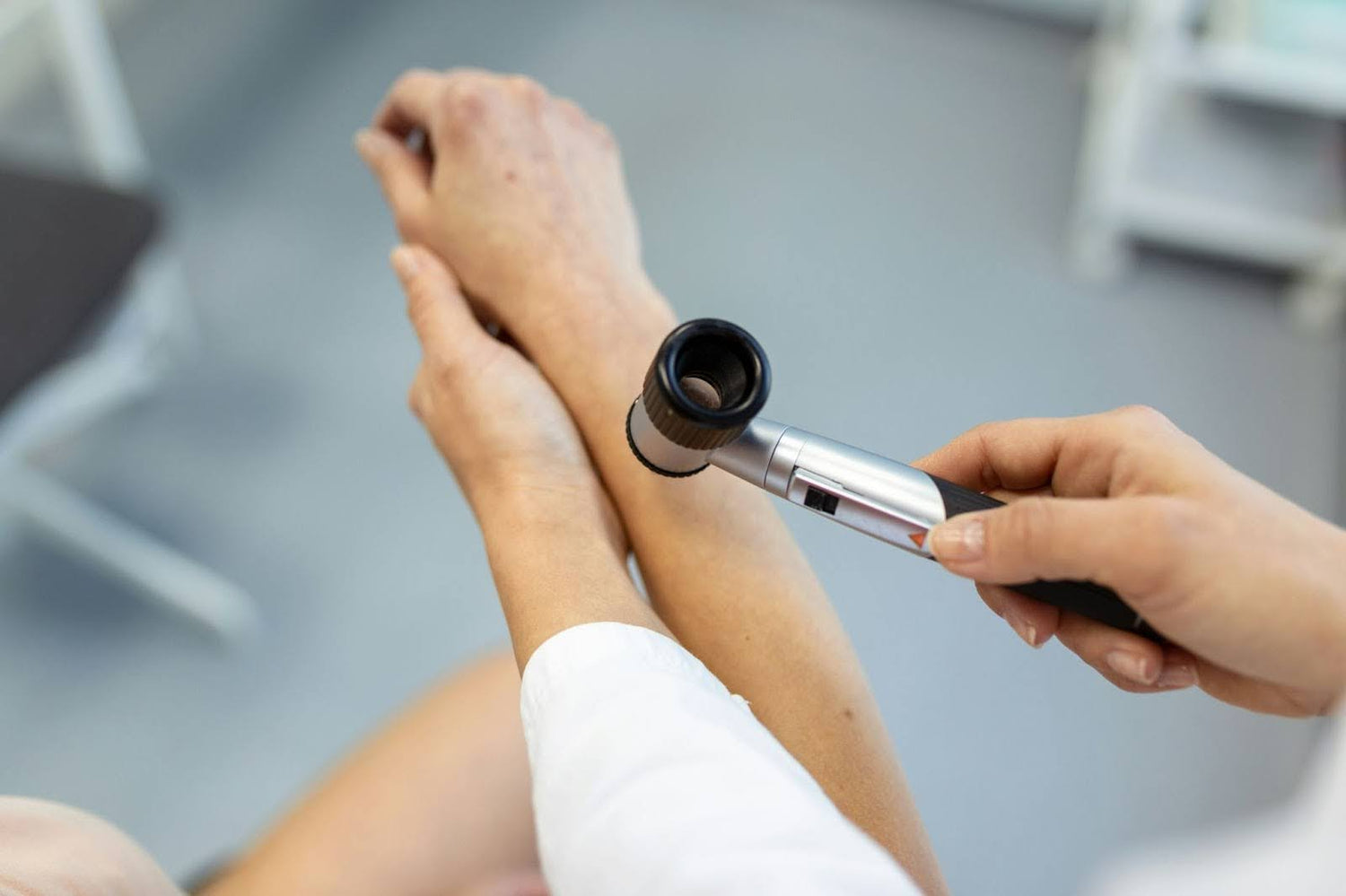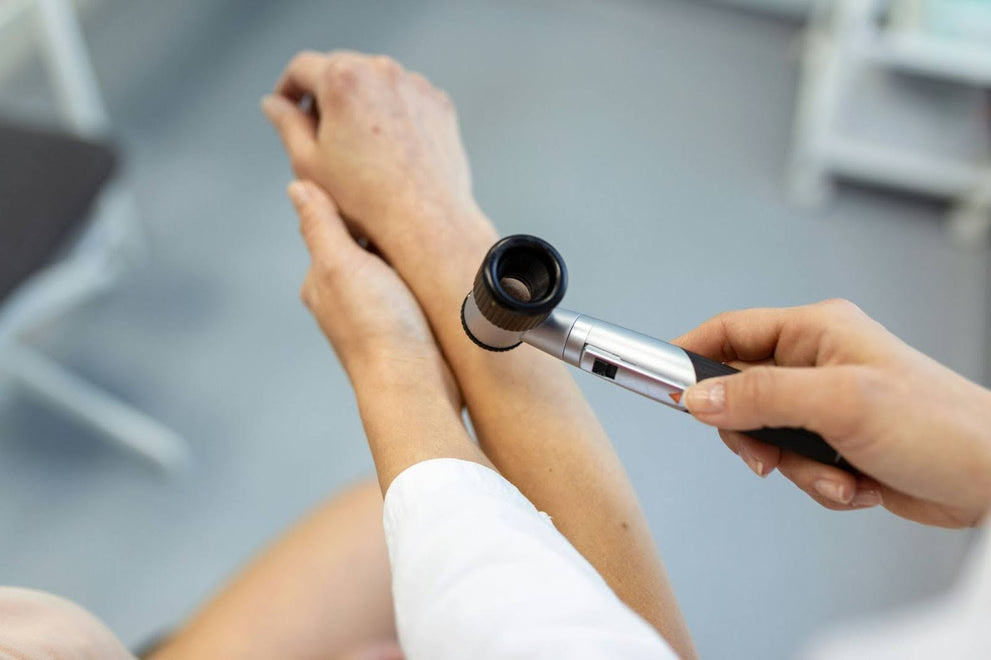Key Takeaways:
- Is Psoriasis Genetic? Psoriasis has a strong genetic component, but genes alone won’t decide your outcome. Environment and immune triggers still matter.
- Big Gene Players In Psoriasis: Researchers have found certain genes linked to psoriasis. The strongest signals come from a gene called HLA-C*06:02 and others that affect how the immune system controls inflammation.
- Family History and Fate: Research suggests that if one parent has psoriasis, the lifetime risk is about 14–28%. If both parents have it, the risk may rise to 40–65%. Still, many people with this family history never develop psoriasis.
That answer is yes. Psoriasis is influenced by many genes and the immune system. The strongest signal comes from a gene called HLA-C*06:02, along with others in the IL-23/Th17 pathway, which is involved in skin inflammation. But genes don’t work alone—factors like infections, skin injury, certain medications, stress, and even the seasons can also play an key role in whether psoriasis appears and when it flares.
Our approach at Broc Shot
We focus on high-quality, third-party tested wellness built around natural sulforaphane from whole broccoli seed powder. This plant compound has been clinically studied for its ability to activate NRF2, the body’s natural antioxidant defense switch. Taken daily, with or without food, natural sulforaphane supports detoxification, helps calm inflammation, and promotes gut balance. Because of this evidence and its quality, Broc Shot is the first supplement to be recognized by the National Psoriasis Foundation—a simple addition to your routine that works best alongside your dermatologist’s care plan.
How Family History Shapes Psoriasis Risk
While family history matters, it won’t decide your future. Psoriasis is influenced by many different genes, each adding a small amount of risk. That means having relatives with psoriasis can raise your chances, but it doesn’t guarantee you’ll develop it. The guide below gives you a quick look at how family history can shape lifetime risk.
- No Parent With Psoriasis: Baseline lifetime risk is low (around 4%).
- One Parent Affected: Lifetime risk typically ~14–28%.
- Both Parents Affected: Risk rises to ~40–65%. These ranges help set expectations, but they’re not guarantees. Lifestyle and trigger management still make a difference.
Even with higher inherited risk, your daily choices make a big difference. Protect your skin from injuries, treat infections promptly, manage stress, and stick with any plan you and your dermatologist might create.
The Gene Signals You’ll See Most Often
When people wonder, “Is psoriasis genetic?” the answer is yes—though it’s not straightforward. There isn’t one specific gene that directly causes psoriasis. Instead, multiple genes each contribute a small amount to the overall risk. This is why having relatives with psoriasis increases the likelihood of developing it, but it doesn’t guarantee that someone with a family history will actually experience the condition.
- HLA-C*06:02: the strongest genetic signal, linked not only to psoriasis risk but also to certain subtypes and, in some studies, differences in response to treatment.
- IL-23/Th17 pathway genes (like IL23R and IL12B): help explain why immune-targeting therapies such as IL-23 and IL-17 blockers work so well.
- Skin-barrier genes (like the LCE3B/C deletion): add risk by weakening the skin’s natural protective layer, independent of immune system changes.
- Rare variants (like CARD14): uncommon, often found in families, and can drive psoriasis-like eruptions.
Large genetic studies across different populations continue to identify new risk genes, but the overall picture stays the same: many genes, each with modest effects, working mainly through immune pathways. Triggers like infections, stress, skin injury, and medications also play a major role in whether, and when, psoriasis actually shows up.
Genetics Isn’t Destiny: Common Triggers Still Matter
Genetics may set the stage for psoriasis, but everyday triggers often decide when flares appear. Common triggers include infections like strep throat; skin injuries from cuts, scratches, shaving, tattoos, or sunburn (called the Koebner phenomenon); certain medications (such as lithium, some beta-blockers, or antimalarials); high stress; and seasonal changes, especially cold, dry weather. Lifestyle factors like alcohol, smoking, higher body weight, poor sleep, or suddenly stopping medications can also make symptoms worse.
The good news is, you can potentially lower your odds of developing psoriasis. Treat sore throats promptly, protect your skin from cuts and sunburn, moisturize after short lukewarm showers, and use a humidifier in winter. Managing stress and keeping a steady sleep routine also help. If you think a medication might be a trigger, talk with your clinician before making any changes. Limiting alcohol and quitting smoking not only support your skin, but your overall health too. Keeping a simple flare diary can be a powerful way to spot your personal patterns.
Practical Steps You Can Take Now
Even if psoriasis is genetic, day-to-day habits still make a difference. If you’re curating a routine for resilient skin, explore our best supplements for skin to complement your dermatologist’s plan. For a simple way to activate NRF2, check out our sulforaphane supplement made with natural sulforaphane from whole broccoli seed powder. You can take it daily, with or without food.
Wondering how this relates to your skin? Start by learning about the general skin benefits of sulforaphane. If psoriasis is your focus, you can also explore how supplements for psoriasis work. Taken consistently, sulforaphane helps your body with detoxification, targets inflammation, and supports gut balance—especially when paired with steady lifestyle basics like good sleep, stress management, and healthy nutrition.
Genetics and Treatment Response (Why This Matters)
Genes don’t just shape risk; they can correlate with treatment phenotypes. For example, HLA-C*06:02 has been linked in some cohorts to differences in biologic response or persistence. You don’t need genetic testing to start care, but discussing patterns (age at onset, family history, nail disease, joints) can help tailor a plan you’ll stick with.
Final Thoughts
So, is psoriasis genetic? Yes—but that’s not a guarantee. Family history and certain genes, like HLA-C*06:02 and others in the IL-23/Th17 pathway, can raise your risk. Still, everyday triggers and care choices often have the biggest say in when and how psoriasis shows up. Think of genetics as a dimmer switch, not an on/off switch.
Keep your plan realistic. Work with your dermatologist, manage common triggers, and build simple habits you can stick with: short lukewarm showers, daily moisturizing, protecting your skin from injury, steady sleep, and stress management. Small steps done consistently work better than complicated routines you can’t maintain.
For added nutrition support, consider natural sulforaphane from whole broccoli seed powder. Clinically studied for its ability to activate NRF2—the body’s antioxidant defense switch—it supports detoxification, helps calm inflammation, and promotes gut balance. Look for a high-quality, third-party tested option like Broc Shot that you can take daily, with or without food, alongside your care plan for psoriasis-prone skin.
Read Also:
- Nutrient-Rich Foods That May Boost Immunity While Undergoing Chemotherapy
- Sulforaphane Benefits for Skin: Natural Support for Radiance And Repair
- How Compounds in Broccoli Sprouts May Support Cancer Defense
Frequently Asked Questions About Whether Psoriasis Is Genetic
If psoriasis is genetic, why do some people with a family history never get it?
In psoriasis, multiple genes raise susceptibility, but environmental and immune triggers are usually needed to start a flare. That’s why two people with similar genetics can have different outcomes. Managing infections, skin injury, stress, and medications helps keep risk lower over time.
Which gene is most closely linked to psoriasis?
HLA-C*06:02 shows the strongest and most consistent association with psoriasis, especially in early-onset disease and family clusters. It’s part of the MHC region that shapes how the immune system recognizes antigens. Many other areas of the genome—especially those tied to IL-23/Th17 signaling—also contribute.
Does HLA-C*06:02 change psoriasis treatment choices?
Research suggests HLA-C*06:02 status can correlate with differences in biologic responses or treatment persistence in some cohorts. However, your clinician will still tailor therapy to severity, comorbidities, and preferences first.
Are there skin barrier genes involved in psoriasis, or only immune genes?
Both. A well-studied example is the LCE3B/C deletion, which affects late cornified envelope proteins important for barrier repair. Barrier variants and immune-pathway variants can add up and act independently in psoriasis.
What about rare mutations? Can one gene “cause” psoriasis?
Rare CARD14 gain-of-function mutations can drive psoriasis-like eruptions in families, but these cases are uncommon. Most psoriasis is polygenic, meaning many genes each add a small amount to risk.
If no one in my family has psoriasis, can I still get it?
Yes. Many people with psoriasis report no family history. Polygenic risk, immune factors, and triggers can converge in anyone, which is why prevention and early management strategies still matter.
How strong is the overall genetic component of psoriasis?
Twin and population studies estimate moderate-to-high heritability; recent biobank-scale analyses often cite figures around ~70%. Heritability isn’t destiny—it reflects population-level contribution of genetics to variation in risk.
Do genetics explain psoriatic arthritis risk, too?
Genetic and immune factors both play a role in psoriatic arthritis, a condition that affects some people with psoriasis. Research shows that having a family member with psoriasis or psoriatic arthritis can increase your chances of developing it. Certain genetic markers in the immune system may also influence how the disease shows up and how it progresses.
But genes aren’t the whole story. Environmental triggers and lifestyle factors matter too, which helps explain why some people with psoriasis develop joint symptoms while others never do. That’s why early recognition is so important—if you notice joint pain, stiffness, or swelling, talk with your dermatologist or rheumatologist. Catching symptoms early means treatment can be adjusted to protect your joints and keep you moving comfortably.
Can nutrition meaningfully support genetically driven psoriasis?
Nutrition can’t change your genome, but it can influence inflammation and skin barrier health. Bioactive natural sulforaphane supports NRF2 pathways relevant to oxidative stress in skin; choose high-quality, third-party tested options and use them consistently with your dermatologist’s plan.
What should I do if psoriasis runs in my family?
Focus on what you can control. Protect your skin from cuts and sunburn, treat infections quickly, review medications with your clinician, manage stress, and keep up a steady skin-care routine. If new symptoms show up, see your dermatologist early and ask about modern treatment options, including IL-23 and IL-17–targeting therapies.
Build supportive routines to stay on track long-term—regular sleep, gentle movement, and nutrition that supports NRF2 (the body’s natural antioxidant defense switch) can all make it easier to manage your skin health day by day.
Sources:
- National Psoriasis Foundation. (2025). Psoriasis risk factors. https://www.psoriasis.org/psoriasis-risk-factors/
- Griffiths, C. E. M., Armstrong, A. W., Gudjonsson, J. E., & Barker, J. N. W. N. (2021). Psoriasis. The Lancet, 397(10281), 1301–1315. https://www.thelancet.com/journals/lancet/article/PIIS0140-6736(20)32549-6/fulltext
- Nature Reviews Disease Primers. (2025). Psoriasis (Primer). Emphasis on HLA-C*06:02 genetics. https://www.nature.com/articles/s41572-025-00630-5.pdf Nature
- Frontiers in Immunology. (2023). Revisiting the interleukin-17 family of cytokines in psoriasis. https://www.frontiersin.org/journals/immunology/articles/10.3389/fimmu.2023.1186455/full Frontiers
- Biomolecules. (2024). Functional genomics and insights into the pathogenesis and treatment of psoriasis. https://www.mdpi.com/2218-273X/14/5/548 MDPI
- Journal of Allergy and Clinical Immunology. (2019). HLA-C*06:02 genotype as a predictive biomarker of biologic treatment response in psoriasis. https://www.sciencedirect.com/science/article/abs/pii/S0091674918327805
- British Journal of Dermatology. (2023). Association of HLA-C*06:02 with biologic survival in psoriasis. https://academic.oup.com/bjd/article-abstract/190/5/689/7459199 Oxford Academic
- Journal of Investigative Dermatology. (2010, 2021 & updates). LCE3B/C deletion and psoriasis risk; antimicrobial LCE proteins. https://www.sciencedirect.com/science/article/pii/S0022202X15352544 ; https://www.sciencedirect.com/science/article/pii/S0022202X2102618X ScienceDirect+1
- BMC Evolutionary Biology. (2016). The psoriasis-associated deletion of late cornified envelope genes. https://link.springer.com/content/pdf/10.1186/s12862-016-0842-6.pdf SpringerLink
- BMC Translational Medicine. (2024). Multi-ancestry GWAS meta-analysis identifies 32 novel psoriasis loci. https://translational-medicine.biomedcentral.com/articles/10.1186/s12967-024-06015-8 BioMed Central






